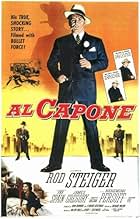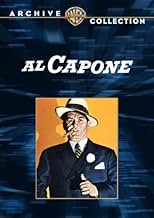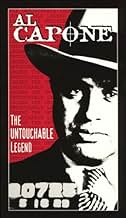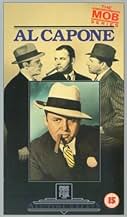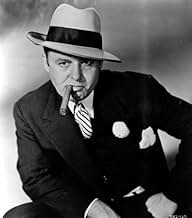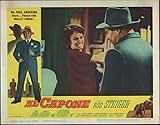Al Capone
- 1959
- Tous publics
- 1h 44m
IMDb RATING
6.7/10
2.1K
YOUR RATING
A chronicle of the rise and fall of Chicago crime boss Al Capone during the Prohibition era.A chronicle of the rise and fall of Chicago crime boss Al Capone during the Prohibition era.A chronicle of the rise and fall of Chicago crime boss Al Capone during the Prohibition era.
- Awards
- 1 win & 1 nomination total
Raikin Ben-Ari
- Ben Hoffman
- (as Ben Ari)
Fred Aldrich
- Funeral Spectator
- (uncredited)
Cindy Ames
- Nurse
- (uncredited)
- Director
- Writers
- All cast & crew
- Production, box office & more at IMDbPro
Featured reviews
Like so many mid-century biographical films, Al Capone marches through the man's life, giving equal weight to each way-point. It also fails miserably by providing no psychological or historical context for how he became one of crime's most notorious characters. In fact, the film succeeds in white-washing this killer. He woos the widow of one of his victims. He repeatedly makes the point that he's never been convicted of any crime. People die, but there is no depiction of Capone's ruthless, brutal side. Rod Steiger in the title role does an admirable job with the shallow script, but this is not enough to make the film worth watching. Oddly, there's no mention of Elliot Ness and when it comes to summing up Capone's end, we're told he died of "an incurable disease." What, audiences in 1959 couldn't handle the word "syphilis"?
It's 1919 Chicago. Al Capone (Rod Steiger) is new in town. Nationwide Prohibition begins in 1920. The violent thug rises to be a top gangster.
This is a brutal depiction of the crime figure. It does have his prominent face scar. I don't always remember it being that prominent although the man is nicknamed Scarface. Overall, the performance has a realistic brutality. It's a rather straight forward biopic. I'm not sure how much new is being done here. Rod Steiger seems to have a dash of Brando but he's not at that level of charisma. The power is present. Others have done it bigger. Nevertheless, it's a very worthy performance.
This is a brutal depiction of the crime figure. It does have his prominent face scar. I don't always remember it being that prominent although the man is nicknamed Scarface. Overall, the performance has a realistic brutality. It's a rather straight forward biopic. I'm not sure how much new is being done here. Rod Steiger seems to have a dash of Brando but he's not at that level of charisma. The power is present. Others have done it bigger. Nevertheless, it's a very worthy performance.
I loved this black and white movie. It stared Rod Steiger who comes across like Mr. Tony Soprano actually. It was told in the tradition of a biography. Capone was so violent yet a great businessman. This movie is borderline FILM NOIR. Mr. Capone, in the movie, starts out as a simple bouncer and them works his way up to the bossman of the Chicago Syndicate. He eventually was convicted on INCOME TAX evasion and sentenced to 11 years at THE ROCK. The movie even takes us into THE ROCK where it shows Capone and how he loses his power. What makes this movie really great is simply ROD's portrayal of Scarface. He plays it very very well. If I had to choose ANY GANGSTER movie from that subject matter, this is it.
Many actors have portrayed Capone over the years. It's virtually a "cottage industry," guaranteeing that yet another Capone flick will hit the screens before the collective audience has quite recovered from its yawn at the last one. And yet, for me, no one has ever come quite so close to nailing the role as Rod Steiger in this 1959 black-and-white low-budget effort.
As a matter of fact, using the term "low-budget" does this film a disservice, calling to mind as it does the run-of-the-mill output of producer/distributor Allied Artists (usually on the scale of "Attack Of The 50-Foot Mummified Woman Meets Godzilla's Teenage Werewolf Son"). For this film, however, the studio assembled a strong acting ensemble which includes Martin Balsam, Nehemiah Persoff, Murvyn Vye, and James Gregory, all of whom deliver standout performances.
Yet it's Steiger whose performance holds this film together. His Capone is a monster whose mood swings defy the term "mercurial," yet his psychopathy seems somehow strangely -- disturbingly -- human. You can sense the demons deep within him, and how they drive him, but you're never allowed to glimpse them, not even momentarily, lest you lose sight of the fact that this man truly is a monster. Eerily compelling, even hypnotic (particularly as he woos -- and wins! -- the widow of a cop he's previously murdered), Steiger invests his characterization with the bravura of the opera which the real-life Capone professed to admire. Alternately wheedling and bullying, bellicose and scheming, he assumes a larger-than-life mythos which resonates all the more uncomfortably due to a sense of plausibility, the feeling that such men do continue to exist among us.
The storyline itself is more or less factual, save for Gregory's character (which isn't even really a composite of any particular real-life law enforcement personnel), as well as a decision to re-name Balsam's character rather than use the identity of the real-life Jake Lingle, upon whom the character is based. Certain incidents have been fictionalized as to the way they happened, but that's to be expected in the interest of dramatic effect.
Overall, the film achieves an almost documentary effect. Steiger's performance makes it a very chilling documentary, indeed.
As a matter of fact, using the term "low-budget" does this film a disservice, calling to mind as it does the run-of-the-mill output of producer/distributor Allied Artists (usually on the scale of "Attack Of The 50-Foot Mummified Woman Meets Godzilla's Teenage Werewolf Son"). For this film, however, the studio assembled a strong acting ensemble which includes Martin Balsam, Nehemiah Persoff, Murvyn Vye, and James Gregory, all of whom deliver standout performances.
Yet it's Steiger whose performance holds this film together. His Capone is a monster whose mood swings defy the term "mercurial," yet his psychopathy seems somehow strangely -- disturbingly -- human. You can sense the demons deep within him, and how they drive him, but you're never allowed to glimpse them, not even momentarily, lest you lose sight of the fact that this man truly is a monster. Eerily compelling, even hypnotic (particularly as he woos -- and wins! -- the widow of a cop he's previously murdered), Steiger invests his characterization with the bravura of the opera which the real-life Capone professed to admire. Alternately wheedling and bullying, bellicose and scheming, he assumes a larger-than-life mythos which resonates all the more uncomfortably due to a sense of plausibility, the feeling that such men do continue to exist among us.
The storyline itself is more or less factual, save for Gregory's character (which isn't even really a composite of any particular real-life law enforcement personnel), as well as a decision to re-name Balsam's character rather than use the identity of the real-life Jake Lingle, upon whom the character is based. Certain incidents have been fictionalized as to the way they happened, but that's to be expected in the interest of dramatic effect.
Overall, the film achieves an almost documentary effect. Steiger's performance makes it a very chilling documentary, indeed.
Chicago in the 1920's: rife with political and police corruption and increasingly run by mobsters. The most famous of them undoubtedly was Al Capone. In this bio-pic, Capone is played very effectively by Rod Steiger. Steiger captured both the role and the man. Capone was a guy of humble origins, but was a bit of a contradiction: he had no education but a love for culture; he was a ruthless gangster but for the most part stayed legally "clean." Steiger captured both the ruthlessness and the culture with his portrayal. Based on actual photographs of Capone that I've seen, Steiger even looked the part. He was very impressive.
The movie basically traces Capone's career in crime from the time he arrives in Chicago in 1919 as a bodyguard to a local crime figure and takes it up to his conviction for income tax evasion of all things (it was the only crime they could ever actually pin on him) in 1931, with a very brief look at Capone in Alcatraz, and a voice-over explaining his last years before his death in 1947. Watching his rise was always interesting. A lot of this is fictional. James Gregory's character (the honest Chicago cop who commits himself and his entire career to bringing Capone down, and from whose perspective the story is told) didn't exist, and there's no portrayal of Capone's actual marriage; instead the movie focuses on a relationship he supposedly develops with a woman (Fay Spain) whose husband he had killed in the early part of his criminal career. The character of the newspaperman Keely (Martin Balsam) was based on a real figure, although the name was changed.
By the standards of the modern era of film-making, this is laughably clean. There are a lot of shootouts, but no blood ever appears on those who are shot and killed, and in general these gangsters are awfully polite! There's an extended look on the planning of the St. Valentine's Day Massacre (as Capone used his men to take out many of his rivals in Chicago while he stayed at his home in Florida) although the Massacre itself doesn't take very long and - again - isn't especially graphic.
This represents an interesting and believable (if not quite historically accurate) look at not only Capone but at the state of Chicago in the era and of the role that Prohibition played in promoting the rise of organized crime, and Steiger's performance alone makes this worth watching. (8/10)
The movie basically traces Capone's career in crime from the time he arrives in Chicago in 1919 as a bodyguard to a local crime figure and takes it up to his conviction for income tax evasion of all things (it was the only crime they could ever actually pin on him) in 1931, with a very brief look at Capone in Alcatraz, and a voice-over explaining his last years before his death in 1947. Watching his rise was always interesting. A lot of this is fictional. James Gregory's character (the honest Chicago cop who commits himself and his entire career to bringing Capone down, and from whose perspective the story is told) didn't exist, and there's no portrayal of Capone's actual marriage; instead the movie focuses on a relationship he supposedly develops with a woman (Fay Spain) whose husband he had killed in the early part of his criminal career. The character of the newspaperman Keely (Martin Balsam) was based on a real figure, although the name was changed.
By the standards of the modern era of film-making, this is laughably clean. There are a lot of shootouts, but no blood ever appears on those who are shot and killed, and in general these gangsters are awfully polite! There's an extended look on the planning of the St. Valentine's Day Massacre (as Capone used his men to take out many of his rivals in Chicago while he stayed at his home in Florida) although the Massacre itself doesn't take very long and - again - isn't especially graphic.
This represents an interesting and believable (if not quite historically accurate) look at not only Capone but at the state of Chicago in the era and of the role that Prohibition played in promoting the rise of organized crime, and Steiger's performance alone makes this worth watching. (8/10)
Did you know
- TriviaMartin Balsam's character, Mac Keeley, was based on a real-life Chicago Tribune reporter named Jake Lingle. Lingle, a "legman" who ran down gang-related stories for the paper, had close ties to Al Capone and other gangsters as well as the notoriously corrupt Chicago Police Department, and he was well-paid by both mobsters and a police commissioner as a "go-between." Lingle was gunned down on June 9, 1930, much as depicted in the movie, after "getting too big for his hat", as Capone put it, and demanding too much for his services (though a Capone rival likely paid for the hit). Apparently legal concerns prevented the producers of this film from using Lingle's name. However, just a few months after this film was released, the TV series Les incorruptibles (1959) told Lingle's story in its third episode and used his actual name.
- GoofsAl Capones had two scars on his left cheek according to actual (if rare - Capone disliked being photographed to show them as is correctly pointed out in the film) photos. The depiction in films like L'Affaire Al Capone (1967) and Capone (1975) is closer to the truth.
- Quotes
Al Capone: Nobody leaves Al Capone, you understand that?
Maureen Flannery: Well I do!
Al Capone: Oh no, you don't!
Maureen Flannery: Would you do me a favor please? Would you kill me?
- ConnectionsEdited into The Mystery of Al Capone's Vaults (1986)
- How long is Al Capone?Powered by Alexa
Details
Box office
- Budget
- $550,000 (estimated)
- Runtime1 hour 44 minutes
- Color
- Aspect ratio
- 1.85 : 1
Contribute to this page
Suggest an edit or add missing content



